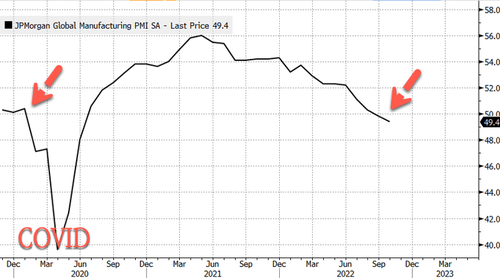FedEx Parks Planes, Maersk Cancels Sails: World Trade Appears To Be Rapidly Deteriorating
Economic storm clouds are gathering worldwide as some of the largest shipping companies warn about sliding global trade. US shipper FedEx and Danish shipping giant A.P. Moller-Maersk A/S have been vocal about emerging signs of a global slowdown. Both of these companies are widely seen as a barometer for international trade.
The latest to warn about weakening economic growth is FedEx CFO Michael Lenz telling an audience Tuesday at the Robert W Baird Global Industrial Conference that the company has reduced flights and parked planes to cut costs in response to soft demand for package delivery.
Look, we absolutely will realize more of the structural cost savings in the second half of the year. That’s where you get more of the benefits start to roll in principally from — at Express, the flight reductions.
When you park the aircraft, particularly the older airplanes that we’re packing, you’re deferring a maintenance event, which is a significant expense. While at the same time, you have relatively low ownership costs on those.
So it’s an operationally and financially flexible way to manage capacity there. So as I said, we’re projecting a lower demand outlook for the foreseeable future here.
I don’t have a perfect crystal ball to say what the overall macro environment will be. Don’t have a full year earnings outlook for FY ’23. So I don’t have any specific projection to give you there, but rest assured, as some of these specifics that I was highlighting illustrate, we are fully committed to continuing to take the actions we need for changed expectations of what the operating environment is.”
Lenz provided more details about how many domestic and international flights were reduced:
We’ve eliminated roughly 8 or 9 international frequencies, about 23 domestic frequencies thus far that were — came into the schedule change we did in October. We’ve got another 8 or 9 domestic frequencies that will go in, in November.
The cost-cutting measures align with the firm’s surprise earnings pre-announcement in mid-September about macroeconomic weakness worldwide. At the time, it said it was withdrawing its fiscal year 2023 earnings forecast.
FedEx CEO Raj Subramaniam then went on CNBC’s Jim Cramer’s evening show and warned Wall Street analysts and investors about a global slowdown, indicating a global recession was ahead.
And it’s not FedEx. Maersk, the world’s largest owner of container ships, lowered its outlook for the growth of 2022 global container demand, forecasting 2023 could be worse. There are even reports that the company is canceling sails.
“There are plenty of dark clouds on the horizon,” the company wrote in its latest earnings report, adding, “this weighs on consumer purchasing power which in turn impacts global transportation and logistics demand.”
The latest from the IMF’s World Economic Outlook and World Bank’s Economic Prospects is a downshift in global economic growth with high inflation, i.e., stagflation.
Then the UN Conference on Trade and Development warned global central banks are hiking interest rates too aggressively, which could trigger an economic crisis.
Keep an eye on JP Morgan’s consolidated global manufacturing PMIs that just went into a contraction.

All the rate hikes by global central banks this year have a 9-12 month lag before hitting world trade. So this all may indicate 2023 could be a disastrous year for the global economy.
[ad_2]
Source link

